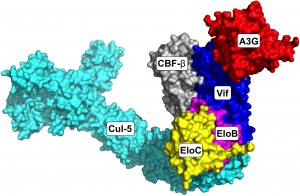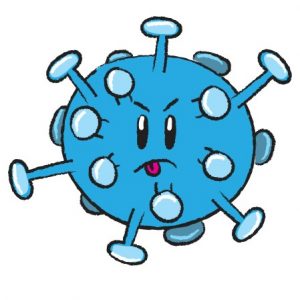The Simon Lab studies virus-host interactions using retroviruses including HIV, SIV, HTLV and human endogenous retroviruses (HERVS).
The first model of the interaction between HIV-1 Vif and human APOBEC3G
Summary of Dr. Simon’s Research Studies:
Research in the Simon lab focuses on HIV-1 pathogenesis and viral host interactions. Complex organisms evolved both innate and adaptive immune defenses to prevent viral infection and/or dissemination. Recently,it became apparent that a group of constitutively expressed genes can efficiently restrict replication of endogenous and exogenous viruses in a species specific manner. Host cells use DNA/RNA editing enzymes as ways to curb invasion from viruses. For example, human APOBEC3G (APOlipoprotein B Editing Complex 3G) has been shown to be active against exogenous retroviruses (HIV-1, HIV-2, Foamy), endogenous mobile genetic elements (e.g., LTR retrotransposons) and DNA viruses (e.g., Hepatitis B). One of the mode of action of cytidine deaminases is one of extensive mutagenesis. The HIV-1 gene Vif effectively counters the antiretroviral activity of APOBEC3G by inducing its degradation. The nucleotide composition of the HIV-1 genome suggests, however, that protection from host-mediated viral cDNA deamination may not be absolute. We have shown that Vif alleles that fail to degrade APOBEC3G, APOBEC3F or both can be detected in vivo. We speculate that intrinsic restriction mediated by cytidine deaminases contributes to HIV-1 sequence diversification.



